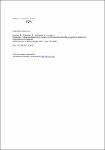Regulation, Integrase-Dependent Excision, and Horizontal Transfer of Genomic Islands in Legionella pneumophila
Lautner, Monika
Schunder, Eva
Herrmann, Vroni
Heuner, Klaus
Legionella pneumophila is a Gram-negative freshwater agent which multiplies in specialized nutrient-rich vacuoles of amoebae. When replicating in human alveolar macrophages, Legionella can cause Legionnaires' disease. Recently, we identified a new type of conjugation/type IVA secretion system (T4ASS) in L. pneumophila Corby (named trb-tra). Analogous versions of trb-tra are localized on the genomic islands Trb-1 and Trb-2. Both can exist as an episomal circular form, and Trb-1 can be transferred horizontally to other Legionella strains by conjugation. In our current work, we discovered the importance of a site-specific integrase (Int-1, lpc2818) for the excision and conjugation process of Trb-1. Furthermore, we identified the genes lvrRABC (lpc2813 to lpc2816) to be involved in the regulation of Trb-1 excision. In addition, we demonstrated for the first time that a Legionella genomic island (LGI) of L. pneumophila Corby (LpcGI-2) encodes a functional type IV secretion system. The island can be transferred horizontally by conjugation and is integrated site specifically into the genome of the transconjugants. LpcGI-2 generates three different episomal forms. The predominant episomal form, form A, is generated integrase dependently (Lpc1833) and transferred by conjugation in a pilT-dependent manner. Therefore, the genomic islands Trb-1 and LpcGI-2 should be classified as integrative and conjugative elements (ICEs). Coculture studies of L. pneumophila wild-type and mutant strains revealed that the int-1 and lvrRABC genes (located on Trb-1) as well as lpc1833 and pilT (located on LpcGI-2) do not influence the in vivo fitness of L. pneumophila in Acanthamoeba castellanii.
No license information

